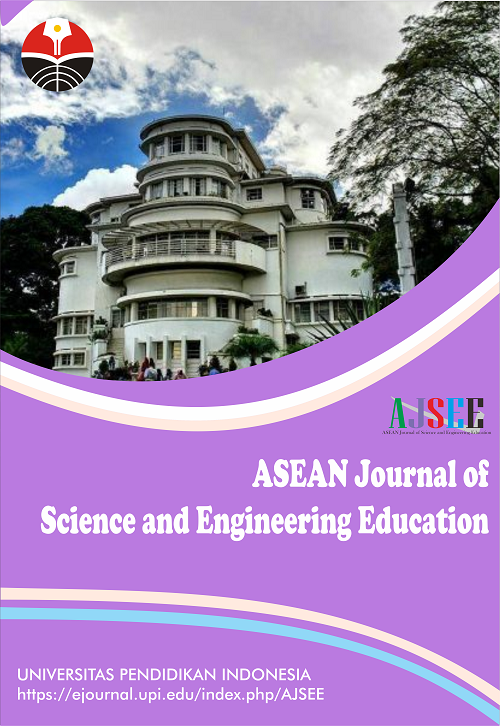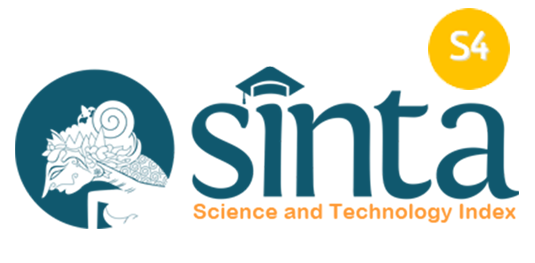Enhancing Exploratory Thinking Through NGSS-Aligned Engineering and Science Practices: A Quasi-Experimental Study Among Saudi Elementary Students
Abstract
This study examines the effectiveness of exploratory activities grounded in the engineering and science practices of the Next Generation Science Standards (NGSS) in fostering exploratory thinking among elementary students in Mecca, Saudi Arabia. Utilizing a quasi-experimental design, the research involved 64 fourth-grade female students divided into experimental and control groups. The “Unit of Energy” was restructured to align with NGSS principles, and both a teacher’s guide and student activity notebook were developed accordingly. An exploratory thinking test (covering nine cognitive domains) was administered as a pre- and post-test over a six-week intervention period. Results revealed statistically significant improvements in the experimental group's post-test scores across all domains of exploratory thinking compared to the control group. The findings highlight the value of integrating NGSS-aligned exploratory activities in science education and underscore the need to incorporate such practices into teacher preparation programs to strengthen scientific inquiry and critical thinking skills at the elementary level.
Keywords
Full Text:
PDFReferences
Acher, A., Arcà, M., and Sanmartí, N. (2007). Modeling as a teaching learning process for understanding materials: A case study in primary education. Science Education, 91(3), 398-418.
Albiladi, W. S. (2022). English teaching and learning in Saudi Arabia: Emerging practices and strategies for achieving the educational objectives of the Saudi Vision 2030. Journal of Language Teaching and Research, 13(4), 781-789.
Allmnakrah, A., and Evers, C. (2020). The need for a fundamental shift in the Saudi education system: Implementing the Saudi Arabian economic vision 2030. Research in Education, 106(1), 22-40.
Almasri, F. (2024). Exploring the impact of artificial intelligence in teaching and learning of science: A systematic review of empirical research. Research in Science Education, 54(5), 977-997.
Andersen, S., Pérez, K. M., and González-Howard, M. (2022). Reimagining science lessons through translanguaging: Supporting multilingual students’ scientific sensemaking in the context of science and engineering practices. Science Scope, 46(2), 25-31.
Bao, L., and Koenig, K. (2019). Physics education research for 21st century learning. Disciplinary and Interdisciplinary Science Education Research, 1(1), 2.
Bielik, T., Finnie, K., Peek-Brown, D., Klager, C., Touitou, I., Schneider, B., and Krajcik, J. (2022). High school teachers’ perspectives on shifting towards teaching NGSS-aligned project based learning curricular units. Journal of Science Teacher Education, 33(4), 413-434.
Christian, K. B., Kelly, A. M., and Bugallo, M. F. (2021). NGSS-based teacher professional development to implement engineering practices in STEM instruction. International Journal of STEM Education, 8, 1-18.
Christian, K. B., Kelly, A. M., and Bugallo, M. F. (2021). NGSS-based teacher professional development to implement engineering practices in STEM instruction. International Journal of STEM Education, 8, 1-18.
Darling-Hammond, L., Flook, L., Cook-Harvey, C., Barron, B., and Osher, D. (2020). Implications for educational practice of the science of learning and development. Applied Developmental Science, 24(2), 97-140.
Ead, H. A. (2024). Trailblazing Egyptian scientists: Inspiring stories of success and social progress. Journal of Humanities and Applied Social Sciences, 6(2), 128-166.
Elgendy, A. A., and Elmeanawy, R. S. (2023). Utilizing earth and space sciences in the light of the next generation science standards (NGSS) for improving scientific and engineering practices among preparatory stage pupils. Port Said Journal of Educational Research, 2(2), 29-78.
Fleeson, W., and Noftle, E. E. (2008). Where does personality have its influence? A supermatrix of consistency concepts. Journal of Personality, 76(6), 1355-1386.
Golan Duncan, R., and L. Cavera, V. (2015). DCIs, SEPs, and CCs, oh my!: Understanding the three dimensions of the NGSS. The Science Teacher, 82(7), 67-71.
Haag, S., and Megowan, C. (2015). Next generation science standards: A national mixed‐methods study on teacher readiness. School Science and Mathematics, 115(8), 416-426.
Hole, A., Grønmo, L. S., and Onstad, T. (2018). The dependence on mathematical theory in TIMSS, PISA and TIMSS Advanced test items and its relation to student achievement. Large-scale Assessments in Education, 6, 1-17.
Hong, E., O’Neil, H. F., and Peng, Y. (2016). Effects of explicit instructions, metacognition, and motivation on creative performance. Creativity Research Journal, 28(1), 33-45.
Iordanou, K., and Constantinou, C. P. (2015). Supporting use of evidence in argumentation through practice in argumentation and reflection in the context of SOCRATES learning environment. Science Education, 99(2), 282-311.
Isabelle, A. D. (2017, January). STEM is elementary: Challenges faced by elementary teachers in the era of the next generation science standards. In The Educational Forum, 81(1), 83-91.
Jensen, J. L., McDaniel, M. A., Woodard, S. M., and Kummer, T. A. (2014). Teaching to the test or testing to teach: Exams requiring higher order thinking skills encourage greater conceptual understanding. Educational Psychology Review, 26, 307-329.
Jepsen, P., Johnsen, S. P., Gillman, M. W., and Sørensen, H. T. (2004). Interpretation of observational studies. Heart, 90(8), 956-960.
Kang, D., and Lee, B. (2020). Analysis of mathematics-related contents in middle school science textbook. New Physics: Sae Mulli, 70(1), 39-49.
Kang, E., Donovan, C., and McCarthy, M. (2018). Exploring elementary teachers’ pedagogical content knowledge and confidence in implementing the NGSS science and engineering practices. Journal of Science Teacher Education, 29(1),9–29.
Kara, S., and Li, W. (2011). Unit process energy consumption models for material removal processes. CIRP Annals, 60(1), 37-40.
Kim, S. Y., and Hamdan Alghamdi, A. K. (2020). Saudi Arabian secondary students’ views of the nature of science within Islamic context. International Journal of Science Education, 42(13), 2266-2283.
Krajcik, J., Codere, S., Dahsah, C., Bayer, R., and Mun, K. (2014). Planning instruction to meet the intent of the next generation science standards. Journal of Science Teacher Education, 25(2), 157-175.
Kruit, P., Oostdam, R., Berg, E., and Schuitema, J.(2018). Effects of explicit instruction on the acquisition of students' science inquiry skills in grades 5 and 6 of primary education. International Journal of Science Education, 40(4),421-441.
Kuhn, D., Arvidsson, T., Lesperance, R., and Corprew, R. (2017). Can engaging in science practices promote deep understanding of them? Science Education, 101(2),232–250.
Ladkau, N., Schmid, A., and Bühler, B. (2014). The microbial cell—functional unit for energy dependent multistep biocatalysis. Current Opinion in Biotechnology, 30, 178-189.
LaDue, N., and Manning, C. (2015). Next generation science standards: A call to action for the geoscience community. GSA Today, 25(2), 28-29.
Lee, O., Quinn, H., and Valdés, G. (2013). Science and language for English language learners in relation to next generation science standards and with implications for common core state standards for english language arts and mathematics. Educational researcher, 42(4), 223-233.
Lin, X., Yang, W., Wu, L., Zhu, L., Wu, D., and Li, H. (2021). Using an inquiry-based science and engineering program to promote science knowledge, problem-solving skills and approaches to learning in preschool children. Early Education and Development, 32(5), 695-713.
Lowenhaupt, R., and McNeill, K. L. (2019). Subject-specific instructional leadership in K8 schools: The supervision of science in an era of reform. Leadership and Policy in Schools, 18(3), 460-484.
Mahanal, S., Zubaidah, S., Sumiati, I. D., Sari, T. M., and Ismirawati, N. (2019). RICOSRE: A learning model to develop critical thinking skills for students with different academic abilities. International Journal of Instruction, 12(2), 417-434.
Malkawi, A. R., and Rababah, E. Q. (2018). Jordanian twelfth-grade science teachers’ self-reported usage of science and engineering practices in the next generation science standards. International Journal of Science Education, 40(9), 961-976.
McGee, S., and Nutakki, N. (2017). The Impact of Adapting a General Professional Development Framework to the Constraints of In-Service Professional Development on the Next Generation Science Standards in Urban Settings. Journal of Urban Learning, Teaching, and Research, 13, 73-89.
Menon, D., and Devadas, M. S. (2019). Engaging preservice secondary science teachers in an NGSS-based energy lesson: A nanoscience context. Journal of Chemical Education, 96(3), 528-534.
Mewaldt, R. A., Cohen, C. M. S., Cook, W. R., Cummings, A. C., Davis, A. J., Geier, S., and Wortman, K. (2008). The low-energy telescope (LET) and SEP central electronics for the STEREO mission. Space Science Reviews, 136, 285-362.
Mintzes, J. J., Marcum, B., Messerschmidt-Yates, C., and Mark, A. (2013). Enhancing self-efficacy in elementary science teaching with professional learning communities. Journal of science teacher education, 24, 1201-1218.
Mohamad Hasim, S., Rosli, R., Halim, L., Capraro, M. M., and Capraro, R. M. (2022). STEM professional development activities and their impact on teacher knowledge and instructional practices. Mathematics, 10(7), 1109.
Omar, A. (2017). Evaluating life science curriculum content at the secondary level in the Arab Republic of Egypt in the light of next generation science standards. Journal of Scientific Education, 20(12), 137–182.
Pereira, L. D., Raimondo, D., Corgnati, S. P., and Da Silva, M. G. (2014). Energy consumption in schools–A review paper. Renewable and Sustainable Energy Reviews, 40, 911-922.
Qablan, A. (2016). Teaching and learning about science practices: Insights and challenges in professional development. Teacher Development, 20(1), 76-91.
Roseman, J. E., Herrmann-Abell, C. F., and Koppal, M. (2017). Designing for the next generation science standards: Educative curriculum materials and measures of teacher knowledge. Journal of Science Teacher Education, 28(1), 111-141.
Sabah, S., Akour, M. M., and Hammouri, H. (2023). Implementing next generation science practices in classrooms: findings from TIMSS 2019. Journal of Turkish Science Education, 20(2), 309-319.
Sayılgan, E., Akkuş, A., & Yıldırım, B. (2022). Effect of STEM designed activities on academic achievement of 7th grade elementary school students in force and energy unit. Science Education International, 33(1), 18-24.
Schaben, C., Andersson, J., and Cutucache, C. (2022, December). A multiple case study to understand how students experience science and engineering practices. In Frontiers in Education, 7, 960346.
Shamsudin, N. M., Abdullah, N., and Yaamat, N. (2013). Strategies of teaching science using an inquiry based science education (IBSE) by novice chemistry teachers. Procedia-Social and Behavioral Sciences, 90, 583-592.
Sharma, R. C. (2022). Reshaping teaching and learning engineering through next-gen learning technologies. Journal of Online Learning Studies, 1(1), 1-8.
Shernoff, D. J., Sinha, S., Bressler, D. M., and Schultz, D. (2017). Teacher perceptions of their curricular and pedagogical shifts: Outcomes of a project-based model of teacher professional development in the next generation science standards. Frontiers in Psychology, 8, 989.
Sneider, C., Stephenson, C., Schafer, B., and Flick, L. (2014). Teacher’s toolkit: Exploring the science framework and NGSS: Computational thinking in the science classroom. Science Scope, 38(3), 10-15.
Stern, L., and Roseman, J. E. (2004). Can middle‐school science textbooks help students learn important ideas? Findings from project 2061's curriculum evaluation study: Life science. Journal of Research in Science Teaching: The Official Journal of the National Association for Research in Science Teaching, 41(6), 538-568.
Téllez, M. F. T. (2021). Self-confrontation: a gateway towards the understanding of english teachers’ pedagogical practice. Revista Boletín Redipe, 10(7), 225-242.
Uyanık, G., and Uyanık, R. Ö. (2024). Effect of the quantum learning model on attitude, anxiety, curiosity, academic achievement and retention in science course. Education Mind, 3(3), 318-330.
Van Driel, J. H., Beijaard, D., and Verloop, N. (2001). Professional development and reform in science education: The role of teachers' practical knowledge. Journal of Research in Science Teaching: The Official Journal of the National Association for Research in Science Teaching, 38(2), 137-158.
Wang, H., Fu, T., Du, Y., Gao, W., Huang, K., Liu, Z., and Zitnik, M. (2023). Scientific discovery in the age of artificial intelligence. Nature, 620(7972), 47-60.
Wardani, D., Rahman, R., Farihah, Z., and Puspita, R. (2022). Developing next generation science standards (NGSS) oriented-based ethnoscience teaching materials: Improving constructing explanation and designing solutions (CEDS) skills for prospective elementary school teachers. Edukasi Islami: Jurnal Pendidikan Islam, 11(4), 539-552.
Weintrop, D., Beheshti, E., Horn, M., Orton, K., Jona, K., Trouille, L., and Wilensky, U. (2016). Defining computational thinking for mathematics and science classrooms. Journal of science education and technology, 25, 127-147.
Wright, G. W., Kite, V., and Park, S. (2024). What are They Good For? The Importance and Value of NGSS Science Practices. The Electronic Journal for Research in Science & Mathematics Education, 28(1), 54-75.
DOI: https://doi.org/10.17509/ajsee.v5i2.82795
Refbacks
- There are currently no refbacks.
Copyright (c) 2025 Universitas Pendidikan Indonesia

This work is licensed under a Creative Commons Attribution-ShareAlike 4.0 International License.














